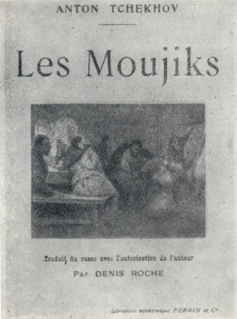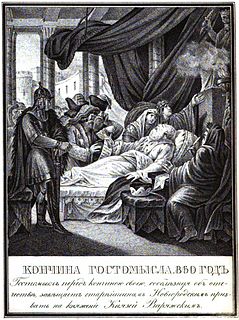
Aleksandr Ivanovich Kuprin was a Russian writer best known for his novels The Duel (1905) and The Pit, as well as Moloch (1896), Olesya (1898), "Junior Captain Rybnikov" (1906), "Emerald" (1907), and The Garnet Bracelet (1911), the latter made into a 1965 movie.

Konstantin Georgiyevich Paustovsky was a Russian Soviet writer nominated for the Nobel Prize for literature in 1965.

Yuri Pavlovich Kazakov was a Russian author of short stories, often compared to Anton Chekhov and Ivan Bunin. Born in Moscow, he started out as a jazz musician, but turned to publishing his stories in 1952. He attended the Maxim Gorky Literature Institute, graduating in 1958.

Anatoly Vasilievich Kuznetsov was a Russian-language Soviet writer who described his experiences in German-occupied Kiev during World War II in his internationally acclaimed novel Babi Yar: A Document in the Form of a Novel. The book was originally published in a censored form in 1966 in the Russian language.

Dark Avenues is a collection of short stories by Nobel Prize-winning Russian author Ivan Bunin. Written in 1937–1944, mostly in Grasse, France, the first eleven stories were published in New York City, United States, in 1943. The book's full version came out in 1946 in Paris. Dark Alleys, "the only book in the history of Russian literature devoted entirely to the concept of love," is regarded in Russia as Bunin's masterpiece. These stories are characterised by dark, erotic liaisons and love affairs that are, according to James B. Woodward, marked by a contradiction that emerges from the interaction of a love that is enamoured in sensory experiences and physicality, with a love that is a supreme, if ephemeral, "dissolution of the self."
The Village is a short novel by the Nobel Prize-winning Russian author Ivan Bunin, written in 1909 and first published in 1910 by the Saint Petersburg magazine Sovremenny Mir under the title Novelet (Повесть). The Village caused much controversy at the time, though it was highly praised by Maxim Gorky, among others, and is now generally regarded as Bunin's first masterpiece. Composed of brief episodes set in its author's birthplace at the time of the 1905 Revolution, it tells the story of two peasant brothers, one a brute drunk, the other a gentler, more sympathetic character. Bunin's realistic portrayal of the country life jarred with the idealized picture of "unspoiled" peasants which was common for the mainstream Russian literature, and featured the characters deemed 'offensive' by many, which were "so far below the average in terms of intelligence as to be scarcely human."

The Life of Arseniev is an autobiographical novel by Nobel Prize-winning Russian author Ivan Bunin seen by many as his most important work written in emigration. The Life of Arseniev was being written and published in parts in the course of the 12 years, in 1927-1939, in France. In 1952 the New-York-based Chekhov Publishers released the first edition of the novel as a whole, entitled The Life of Arseniev. Youth.
Mitya's Love is a short novel by Nobel Prize-winning Russian author Ivan Bunin written in 1924 and first published in books XXIII and XXIV of the Sovremennye Zapiski Paris-based literary journal in 1925. It also featured in a compilation of novelets and short stories published the same year in France.

Cursed Days is a book by Nobel Prize-winning Russian author Ivan Bunin, compiled of diaries and notes he made while in Moscow and Odessa in 1918-1920. Fragments from it were published in 1925-1926 by the Paris-based Vozrozhdenye newspaper. In its full version Cursed Days appeared in the Vol.X of The Complete Bunin (1936), compiled and published in Berlin by the Petropolis publishing house. In the USSR the book remained banned up until the late 1980s. Parts of it were included in the 1988 Moscow edition of The Complete Bunin. After the collapse of the Soviet Union, Cursed Days became immensely popular in its author's homeland. Since 1991, no less than fifteen separate editions of Bunin's diary/notebook have been published in Russia. The English translation, made by Bunin scholar Thomas Gaiton Marullo, was published in 1998 in the United States by Chicago-based Ivan R. Dee Publishers.
Loopy Ears is a short story by Nobel Prize-winning Russian author Ivan Bunin which was written in 1917 and gave his posthumous 1954 collection its title. The story was first published in the seventh issue of the Slovo anthology and remains to this day one of the most talked about Bunin's stories, being the first piece of work in the Russian literature featuring a serial killer as the main character. Mark Aldanov considered the story as one of the Bunin's best.

The Gentleman from San Francisco is a short story by the Nobel Prize-winning Russian author Ivan Bunin, written in 1915 and published the same year in Moscow, in the 5th volume of Slovo (Word) anthology. Translated into English by D. H. Lawrence, the story is one of Bunin's best known and regarded as classic.
Antonov Apples is a short story by Nobel Prize-winning Russian author Ivan Bunin, written in 1900 and published the same year in the October issue of the Saint Petersburg Zhiznh (Life) magazine, subtitled "Sketches from the Epitaph book".
"Dreams" is a novella by Nobel Prize-winning Russian author Ivan Bunin, written in the late 1903 and first published in the first book of the Znanie (Knowledge) Saint Petersburg literary almanach in 1904, where it was coupled with another short novella, "The Golden Bottom", under the common title "Black Earth" (Чернозём). "Dreams" is generally regarded as the turning point in Bunin's literary career, marking the radical turn towards social issues prior to which he had mostly avoided.

About Chekhov is a book of memoirs by Nobel Prize-winning Russian author Ivan Bunin, devoted to Anton Chekhov, his friend and major influence. Bunin started working on the book in the late 1940s in France. It remained unfinished, and was completed by the writer's widow Vera Muromtseva, and came out posthumously in New York City, in 1955. Translated by Thomas Gaiton Marullo, the book was published in English in 2007, under the title About Chekhov. The Unfinished Symphony.

The Vampire is a gothic novella by Aleksey Konstantinovich Tolstoy, first published in Saint Petersburg in 1841 under the pseudonym of Krasnorogsky.

"The Grasshopper" is an 1892 short story by Anton Chekhov.

"Peasants" is an 1897 novella by Anton Chekhov. Upon its publication it became a literary sensation of the year, caused controversy but in retrospect is regarded as one of Chekhov's masterpieces.

"The Bishop" is a 1902 short story by Anton Chekhov, first published in the April 1902 issue of Zhurnal Dlya Vsekh. The story, telling about the last days of a terminally ill priest, in many ways reflects the psychological state of the author, who was at the time full of premonitions of his own inevitable demise, and in that respect is considered to be partly autobiographical.

















